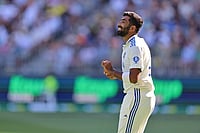In July 2002, I wrote (in Frontline)that the Liberation Tigers of Tamil Eelam's (LTTE's) eastern commander, 'Colonel' Karuna @ VinayagamoorthiMuralitharan, would some day tell his leader Prabhakaran "I will look after the east and you look afterthe north." In less than two years, this is exactly what has happened. Not only that, Karuna wants theeast of Sri Lanka recognized as 'Southern Tamil Eelam'.
The LTTE has begun to crack after years of working as a tight, disciplined terrorist outfit; anorganization, which brutally assassinated Prime Minister Rajiv Gandhi and Sri Lankan President R. Premadasa,and created havoc in the island. Many Sri Lankans still refuse to accept that such audacity is possible withinthe command structure of the LTTE, and believe Karuna's rebellion to be a possible ploy.
The fact, however, is that whatever has happened so far is very much for real. The cracks were alreadythere and those who understood the organization knew the breach was coming. The question, however, is will itcontinue?
Sri Lanka's northern Tamils have always thought of themselves as superior, within the LTTE hierarchy, to the easternTamils, and this has naturally created resentment among the eastern cadres. It was Prabhakaran's northernTamils who first led the struggle to divide the island nation and create an Eelam (homeland). AmongPrabhakaran's reasons for the armed struggle was a feeling that high caste Tamils looked down on the lowercastes, including the fisherman community from which Prabhakaran, and a significant proportion of the LTTEcadres, hail.
The eastern Tamils joined Prabhakaran in his struggle without any qualms, at the time. However, in recentyears the predominance of some high caste Tamils of the northern district within the leadership structure ofthe LTTE has resulted in problems with the eastern Tamils led by Karuna, who has been demanding the removal ofsuch leaders.
Unlike the north, the British trained Special Task Force (STF) of the Sri Lankan police always had the upperhand and did not allow the LTTE to gain much control in the east. The scenario, however, changed rapidly withthe emergence of a ruthless easterner, Karuna.
He became a hero of the LTTE, fighting in the north, leading many battles against the Sri Lankan Army. Hemade his men from the east tough as nails and led them into battle after battle in the north, winning thegrudging admiration even of the Sri Lankan generals. He secured Prabhakaran's trust and rose, eventually, tothe rank of the LTTE's commander for the eastern region. Many believe that Prabhakaran saw a younger versionof himself in Karuna. Perhaps Prabhakaran failed to realize that Karuna would, someday, become a threat tohim, and dare to challenge his iron rule and authority.
Karuna's statement indicates that the main difference with Prabhakaran arose over the former's reluctance tosend additional cadres to the north. Karuna also charged that electoral candidates opposing the LTTE-backedTamil National Alliance (TNA) in the east, were killed without his knowledge, and that such killings were notacceptable to him.
Among the other issues raised was the complaint that easterners were not treated well, nor given a properplace in the LTTE. He also wanted the dreaded leader of the LTTE intelligence wing, Pottu Amman (wanted inIndia in connection with Rajiv Gandhi's assassination), political wing leader Thamil Chelvan and 'PoliceChief' Nadesan, removed from their posts, a demand which would evidently be unacceptable to Prabhakaran.
In response, the LTTE sacked Karuna and issued statements that he had rebelled due to 'personality clashes'.He was warned and offered amnesty, but the behind the scenes developments within the LTTE remain unknown. AnLTTE political wing member, Kannan, stated from Batticaloa:
"This is what we always wanted. We are with Karuna and the people are behind him."
Kannan claimed to give voice to what most LTTE cadres in Batticaloa wouldn't dare say openly. Karuna hasalso been claiming the support of the east, but an effective demonstration of support is yet to manifestitself. Given the LTTE's history of ruthlessness, fear may well be a factor, and the people may hope thatKaruna would take the battle forward on their behalf.
The Elections
The split in the LTTE has come at a time when Sri Lanka is gearing up for elections. Though the LTTE itselfis not fielding any candidates, it has announced its support for the TNA. Karuna has said openly that he wouldabide by the LTTE's decision to support the TNA candidates, and that they were free to campaign in the east.The TNA is now contesting under the banner of the Federal Party, since Tamil United Liberation Front (TULF)leader, V. Anandasangaree, has gone to court against the use of the TNA party symbol, the Rising Sun.
Despite Karuna's assurance, however, TNA candidates have slowed down their campaign activities, as some ofthem are unsure of the fallout between Prabhakaran and his erstwhile deputy. Prabhakaran may be the leaderwhose instructions the TNA candidates have to follow, but Karuna is the strongman of the east now. This mayreduce the number of seats the TNA hopes to get in the elections.
Tamil sources in Batticaloa also said that voter participation in the east could also fall belowexpectations due to the conflict in the LTTE. This could result in some advantage accruing to the FreedomAlliance (FA) led by President Chandrika Kumaratunge and supported by the Marxist Janatha Vimukthi Peramuna (JVP),as well as to Tamil parties such as the Eelam People's Democratic Party (EPDP), the Eelam People'sRevolutionary Liberation Front (EPRLF), and breakaway groups of the Sri Lanka Muslim Congress (SLMC). Further,TULF leader V. Anandasangaree who is standing alone against the LTTE, is contesting the elections as anindependent candidate from Jaffna.
It is well known that Prime Minister Wickremasinghe is banking on the TNA's support to form a Government,and the fewer the seats the Tamil coalition captures, the more difficult his task. The Karuna factor,consequently, is becoming crucial in the elections, and could indirectly help Kumaratunge. At present,however, it is evident that neither Kumaratunge nor Wickremsinghe are willing to be seen as directly orindirectly being associated with, or supporting 'Karuna Amman', something they may have been willing to dobefore the peace process began and when the war was in full gear.
The elections have currently taken precedence over the peace process, and the country is now waiting to seethe new formula that emerges in the numbers game of the next Parliament. Whatever the outcome, it is clearthat the winning party will have to carry on with the peace process.
Whether it is Wickremasinghe and his allies, or Kumaratunge and her allies, they will now have to deal, notonly with Prabhakaran, but Karuna as well. This would also create problems for the Norwegian mediators. Karunahas already made a request for the negotiation of a separate agreement. A situation in which onlyPrabhakaran's group participates in the talks, and Karuna maintains his armed wing in the east, would beimmensely complicated.
Karuna would definitely seek a role in the negotiations. The Sri Lankan Government may take the stand thatit is the facilitator's (Norway's) responsibility to bring 'one LTTE' together, or as Kumaratunge's partysays, they would want representation of 'all Tamils'.
Everything now depends on whether Karuna can hold on to his newfound power. Prabhakaran, naturally, cannot beexpected to remain passive and silent, and Karuna must know that he is already moving. He may accuse Karuna ofbetraying the Tamil cause, or the response may be more drastic.
Prabhakaran is still the master of terror, though, with his current bid for peace and the enormousinternational visibility his actions attract, extreme actions against a prominent target have becomerelatively difficult. Yet, one cannot help wondering whether Karuna's days are numbered. It is probable thatonly the stronger of the two will survive.
Bandula Jayasekara is correspondent for The Island, Colombo. Courtesy, the South Asia IntelligenceReview of the South Asia Terrorism Portal















